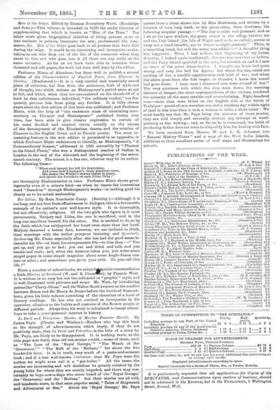In. Peril and Privation : Stories of Marine Disaster Retold.
By James Payn. (Chatto and Windus.)—Readers who bay this book on the strength of advertisements which imply, if they do not positively state, that In Peril and Privation is the title of a story by Mr. Payn, are likely to be disappointed. It is nothing more, as the title-page sets forth, than old sea-stories retold, —some of them, such as "The Loss of the ' Royal George,'" "The Wreck of the Grosvenor,' " " The Raft of the Medusa,' " for about the five hundredth time. It is, in truth, very much of a paste-and-scissors book ; and if a less well-known litterateur than Mr. Payn were the author, we might even call it a "pot-boiler." All the same, the stories are interesting and will doubtless be greatly relished by the young folks for whom they are mainly intended, and there may con ceivably be boys now-a-days who never heard of the /loyal George,' the Grosvenor,' and the Madam' Bat their stories are all told, and hundreds more, in that once popular serial, " Take of Shipwreck and Adventures at Sea." About the Royal George,' Mr. Payn quotes from a letter shown him by Miss Martineau, and written by a relative of hers long dead, to her great-niece, from Southaea, the following singular passage :—" The day is calm and pleasant, and as I sit at the open window, the great vessel in the offing, betwixt me and the Fair Island [the Isle of Wight used to be so called], seems to sway not a hand-breadth, nor to flutter a single pennant." Then, in a trembling hand, but still the same, was added :—" A dreadful thing has happened. When I had written that beginning of my letter, Dorothy, I looked again southward ; the sea was waveless as before, and the Fairy Island sparkled in the sun; but betwixt us and it I saw no trace of the great three-decker. I thought my brain had gone wrong and rang the bell for Agnes ; but when she, too, scald see nothing of her, a terrible apprehension took hold of me ; and when the alarm guns from the fort began to thunder, I knew the vessel had gone down. I hear near a thousand men were aboard of her." The very quietness with which the ship went down, the seeming absence of danger, the utter unpreparedness of the victims, rendered the calamity all the more terrible and overwhelming. Eight hundred men—more than were killed on the English side at the battle of Trafalgar—perished on a waveless sea and a windless day within sight of land in less time than it took a woman to write a short letter ! We need hardly say that, Mr. Payn being the narrator of these stories, they are told simply and naturally, without any attempt at word- painting or fine writing ; and, so far as he is concerned, the habit of producing fiction does not seem to disqualify him for dealing with fact.
We have received from Messrs. W. and A. K. Johnston two " Natural History Plates " and a map of the West India Islands, additions to their excellent series of wall maps and illustrations for schools.


































 Previous page
Previous page